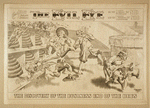"We'll see how the surgery and histology go. Then we'll start with chemo the week following. A little light chemo: vincristine and----"
"Vincristine?" interrupts the Mother. "Wine of Christ?"
"The names are strange, I know. The other one we use is actinomycin-D. Sometimes called 'dactinomycin.' People move the D around to the front."
"They move the D around to the front," repeats the Mother.
"Yup!" the Oncologist says. "I don't know why--they just do!"
"Christ didn't survive his wine," says the Husband.
"But of course he did," says the Oncologist, and nods toward the Baby, who has now found a cupboard full of hospital linens and bandages and is yanking them all out onto the floor. "I'll see you guys tomorrow, after the surgery." And with that, the Oncologist leaves.
"Or rather, Christ was his wine," mumbles the Husband. Everything he knows about the New Testament, he has gleaned from the sound track of Godspell. "His blood was the wine. What a great beverage idea."
"A little light chemo. Don't you like that one?" says the Mother. "Eine kleine dactinomycin. I'd like to see Mozart write that one up for a big wad o'cash."
---Lorrie Moore, "People Like That Are the Only People Here: Canonical Babbling in Peed Onk" in Birds of America (1998)
Moore's story originally ran in The New Yorker; while there are many passages that more adequately capture the subject matter, tone, and unique style of this piece, oddly enough, this is one that I recall from my initial reading of the piece in the magazine over a decade ago. Moore's depiction of the typical Oncologist as part mathematician, part "mad, overcaffienated scientist" is exemplified through this dialogue in which the doctor's superficial and somewhat lighthearted description ("Yup!") of the chemotherapeutic agents stands in stark contrast to the desperation, confusion, and enervation of parents in the pediatric oncology ward.
The story is told through the perspective of "The Mother," a writer whose point of view shifts precariously between the darkly comedic and the abject. Her eighteen month old son has been diagnosed with Wilms' tumor, a kidney cancer, and the reader follows her on her dizzying journey into the pediatric oncology ward and the experiences of parents who endure the ineffable. The narrator's stream of consciousness disorients and then reorients the reader, revealing that what seems as surreal as a nightmare is actually a reality.
The next entry will also come from this piece.
"Vincristine?" interrupts the Mother. "Wine of Christ?"
"The names are strange, I know. The other one we use is actinomycin-D. Sometimes called 'dactinomycin.' People move the D around to the front."
"They move the D around to the front," repeats the Mother.
"Yup!" the Oncologist says. "I don't know why--they just do!"
"Christ didn't survive his wine," says the Husband.
"But of course he did," says the Oncologist, and nods toward the Baby, who has now found a cupboard full of hospital linens and bandages and is yanking them all out onto the floor. "I'll see you guys tomorrow, after the surgery." And with that, the Oncologist leaves.
"Or rather, Christ was his wine," mumbles the Husband. Everything he knows about the New Testament, he has gleaned from the sound track of Godspell. "His blood was the wine. What a great beverage idea."
"A little light chemo. Don't you like that one?" says the Mother. "Eine kleine dactinomycin. I'd like to see Mozart write that one up for a big wad o'cash."
---Lorrie Moore, "People Like That Are the Only People Here: Canonical Babbling in Peed Onk" in Birds of America (1998)
Moore's story originally ran in The New Yorker; while there are many passages that more adequately capture the subject matter, tone, and unique style of this piece, oddly enough, this is one that I recall from my initial reading of the piece in the magazine over a decade ago. Moore's depiction of the typical Oncologist as part mathematician, part "mad, overcaffienated scientist" is exemplified through this dialogue in which the doctor's superficial and somewhat lighthearted description ("Yup!") of the chemotherapeutic agents stands in stark contrast to the desperation, confusion, and enervation of parents in the pediatric oncology ward.
The story is told through the perspective of "The Mother," a writer whose point of view shifts precariously between the darkly comedic and the abject. Her eighteen month old son has been diagnosed with Wilms' tumor, a kidney cancer, and the reader follows her on her dizzying journey into the pediatric oncology ward and the experiences of parents who endure the ineffable. The narrator's stream of consciousness disorients and then reorients the reader, revealing that what seems as surreal as a nightmare is actually a reality.
The next entry will also come from this piece.






No comments:
Post a Comment